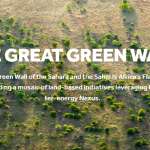Increasing global deforestation is taking on dramatic proportions, with devastating consequences that are alarmingly reflected in areas of high population density, such as the Sahel and sub-Saharan Africa. This phenomenon is significantly contributing to migratory flows, further exacerbating the challenges already present. Current prospects indicate an imminent failure to achieve the ambitious global conservation goals set by 2030.
Over the course of 2022, global deforestation has reached horrifying figures, with more than 16 million acres of forest land lost, with more than 10 million of those concentrated in precious tropical primary forests. In particular, rapid deforestation in the Sahel threatens not only biodiversity but also environmental stability, triggering a cycle of events that contribute to forced migration. The accelerated loss of natural resources, combined with the devastating impacts of climate change, creates an explosive cocktail of instability and human suffering.
Tropical forests, once considered beacons of biodiversity and bulwarks against climate change, are now on the brink of collapse. Without immediate and decisive interventions, these precious natural resources risk transforming from carbon absorbers into sources of emissions, amplifying the harmful effects of global warming and extreme climate events. Vital tropical basins, such as the Amazon, Congo and the Asia-Pacific, are on the verge of becoming epicenters of a climate catastrophe of unimaginable proportions
The gravity of the situation requires immediate and sustainable action to secure a future for forests and mitigate the rapidly escalating climate crisis. Currently, only a little more than $2 billion a year is allocated globally to forest protection, an insignificant figure compared to international investments in less crucial sectors. Indigenous peoples and local communities, despite having proven to be effective guardians of forests, are left without the resources needed to manage their lands, further fueling environmental injustice.
The reports highlight the urgency of concrete actions by 2030, including ending subsidies for activities harmful to ecosystems and radical reform of global trade laws in favor of forests. It is imperative to recognize the land rights of indigenous peoples early and adopt a rapid but gradual transition to nature-based economies.
As governments are held to account for the promises they have made, successful examples such as the ARPA program in Brazil and WWF Forests Forward demonstrate that science-based approaches can be successfully implemented locally and internationally. The protection of forests, the transition to sustainable and transparent supply chains, and the urgent restoration of essential habitats emerge as categorical imperatives to address the current crisis in an integrated and shared way. The lack of decisive action risks leading us towards a dark future, in which the destruction of forests will result in an inestimable price for humanity and the entire planet.


